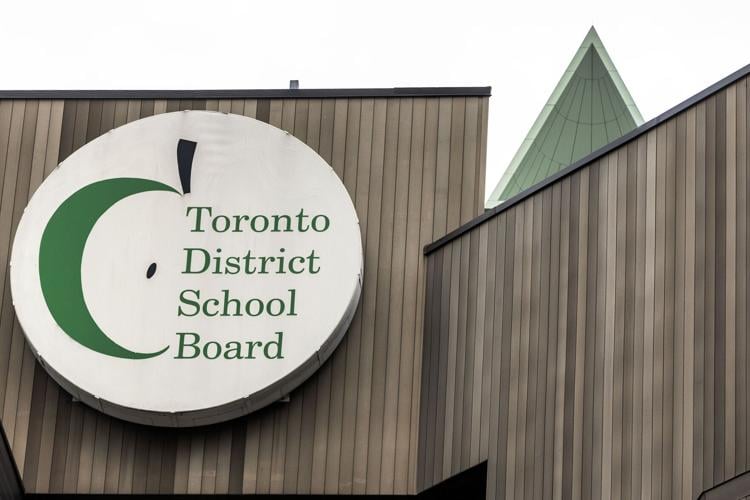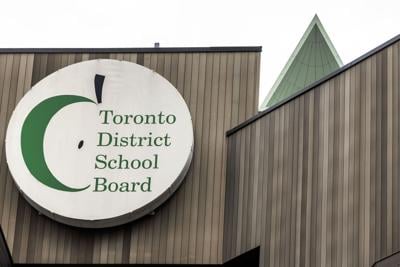A temporary ban on students sharing their family’s culture in class. A parent-organized Pride event┬ámoved outside school hours. Teachers afraid to answer students’ questions around the Israel-Hamas war.
Over the past academic year, ╬┌Ð╗┤½├¢ parents and teachers say activities and discussions that would typically be normal to have in the classroom have suddenly become a source of fear and confusion ÔÇö and they pin the blame on an edict┬ádropped by the Ontario government last September.
Ahead of the┬áone-year anniversary of the Oct. 7 attacks,┬áthen-education minister Jill Dunlop┬áissued a memo to Ontario school boards to keep “political biases”┬áout of the classroom to ensure these spaces remain “safe, inclusive and welcoming for all students and staff.”
It came as the ╬┌Ð╗┤½├¢ District School Board and other boards asked for guidance on addressing hate and geopolitical tensions in schools amid a rise in antisemitism, Islamophobia and anti-Palestinian discrimination since October 2023.
- Kristin Rushowy, Isabel Teotonio
But the ministry’s memo doesn’t define what it considers “political biases” ÔÇö nor would the ministry provide a definition when asked directly by the Star ÔÇö and many worry the lack of specificity will affect how ╬┌Ð╗┤½├¢’s public schools handle certain topics, as administrators and educators try to figure out what is and isn’t allowed.
Can civic lessons on who is prime minister continue as normal? What about sex-ed lessons on different genders and sexualities? Class discussions around race?
“Nothing is neutral,” said Carl James, a professor and the Jean Augustine Chair in Education, Community & Diaspora at York University. “The curriculum cannot be seen as outside of providing and producing a way of seeing things.”
The Star has previously reported on incidents when the TDSB has used the ministry’s directive to block certain field trips and movie screenings, and censor parts of high school yearbooks.
These cases involved matters related to Palestine┬áÔÇö along with┬áactivities and discussions around Israel and Tibet┬áÔÇö┬áreflecting broader concerns the province’s directive has largely been used to shut down conversations on the topic.
For its part, the TDSB said in an emailed statement to the Star that “The Ministry directive applies broadly to any school or classroom activity, outside the established curriculum.”
But, the board said it does not have a ÔÇ£specific definitionÔÇØ for what constitutes a political bias.
The Star spoke with several TDSB parents and teachers, many of whom did not want their names published due to fears of reprisal from the board and other parents. They recounted stories over the past year of their children feeling afraid or being reprimanded for bringing up certain topics, and educators feeling unable to fully support their students in the classroom.
Not everyone is opposed to the directive, however, with some saying the classroom is not a place for discussions around international politics, with one parent in support of the edict adding that educators could still teach students about civics, queer issues and Indigenous history without bringing up politics.
Questions of identity
When a public speaking competition was coming up at the elementary school of Zo├½ Wool’s child this past year, the west-end parent said students were invited to write a short speech on an important issue.
But when Wool’s child wanted to talk about Palestine, she said they were told it was “not a good idea.”
Wool said the incident came around the same time the school’s principal allegedly put a blanket ban on students sharing their culture in class ÔÇö but that the ban was later lifted after the principal met with parents.
Neither Wool nor her child is Palestinian (they are Jewish), but she worries about the impact the ministry’s memo will have on those who are.
“Palestinian families are being given the message by the Ministry of Education that there is something wrong or dangerous or problematic about their very identity and history and that acknowledging their existence puts other kids at risk,” Wool said.
If students donÔÇÖt feel safe in the classroom, they become disengaged and less interested in learning, according to Todd Cunningham, a psychology professor at the U of T’s Ontario Institute for Studies of Education.
This is particularly true if a student feels their identity is being ignored or brushed aside.
“If you are fearful that what you talk about or if you bring up your lived experience in class is going to evoke a negative reaction, then you go quiet or you go defensive,” he said, adding students might experience more anxiety in these situations.
Palestinian teachers who spoke to the Star┬ásaid they, too, felt constrained by the province’s edict, even when students ask them questions about their heritage.

The watermelon and Palestinian flag pins on the Palestinian teacher’s fanny pack. The elementary school educator said she’s afraid to answer student questions around the pins.
Andrew Francis Wallace/╬┌Ð╗┤½├¢ Star“I’m too scared,” said a Palestinian TDSB elementary teacher, who explained how she doesn’t answer her young students’ questions on what the Palestinian flag and watermelon pins┬áattached to her fanny pack represent.
The Star agreed to not name the teacher due to her fears of being reprimanded by the TDSB.
“It’s truly awful that in a learning environment, I can’t freely talk about a country,” she continued.
In its emailed statement to the Star, the TDSB said it respects the identities of all its students and staff, and also adheres to the Ontario Human Rights Code and the Charter of Rights and Freedoms.
“Creating inclusive and supportive learning environments for all students of all identities continues to be our priority,” the board wrote, adding that any concerned parents or caregivers should contact their schoolÔÇÖs principal.
Supporters and critics respond
The Ministry of Education did not answer a list of specific questions sent by the Star, instead sending a previous statement defending its edict.
“Schools should be focused on educating students and helping them graduate with strong reading, writing and math skills that lead to good-paying jobs,” Emma Testani, press secretary for Education Minister Paul Calandra, wrote in the emailed statement.
Meanwhile Josh Landau, Ontario’s director for government relations at the Centre for Israel and Jewish Affairs, voiced support for the directive, pointing to on growing concerns of antisemitism in Ontario’s K-12 schools.
“When bias goes unchecked, it directly impacts the safety and security of all students,” Landau wrote in an emailed statement.
However, those critical of the directive believe the vague language around what constitutes a bias could end up harming students, particularly those from marginalized communities.
One such critic, elementary school┬áparent Alice Romo, pointed to the fact that a┬áparent-organized Pride event at her child’s school last month felt derailed by the ministry’s directive.
The event, held every June, typically involves parents bringing in chalk for students to draw art and write LGBTQ-friendly messages on the pavement during class. Rainbow freezie pops are also involved┬áÔÇö a treat that the kids always look forward to and that add to the end-of-year excitement, according to Romo.
But this year the event was held outside of school hours.
“It did feel like we had to strategically manoeuvre around policies,ÔÇØ Romo said. (She noted that┬áthe schoolÔÇÖs principal said the day after the event that the chalk art could stay, even though it was unclear to her if the event violated the directive at all.)
Although students are off on summer break, Romo still worries the ministryÔÇÖs directive will continue to affect her child’s learning, pointing to lessons around Canada’s colonial history for National Day of Truth and Reconciliation in September.
“Are we going to have to be watering things down and maybe not talk about things as explicitly as we would previously?” she said.
“It feels like we’re taking a step backwards.”


































To join the conversation set a first and last name in your user profile.
Sign in or register for free to join the Conversation